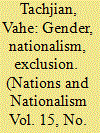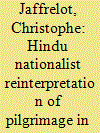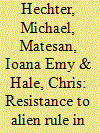|
|
|
Sort Order |
|
|
|
Items / Page
|
|
|
|
|
|
|
| Srl | Item |
| 1 |
ID:
086740


|
|
|
|
|
| Publication |
2009.
|
| Summary/Abstract |
The discourse on the integration of ethnic minorities in the Netherlands has undergone profound changes over the past few decades. This article analyses how discourses in politics and academia have revolved around changing emphases upon the social capital processes of 'bonding' of individuals within groups and 'bridging' of individuals to the wider society. Four episodes of discourse and policy may be distinguished: denial of being a country of immigration until the 1970s; the Minorities Policy in the 1980s; the Integration Policy of the 1990s; and the rise of a more assimilationist discourse after the turn of the millennium. The country thus began in the post-war period with a pluralist perspective toward integration rooted in the traditional religious and ideological 'pillarisation' of society, shifting first to a multicultural perspective, then to an integrationist and, finally, in the new millennium, to an assimilationist perspective.
|
|
|
|
|
|
|
|
|
|
|
|
|
|
|
|
| 2 |
ID:
086734


|
|
|
|
|
| Publication |
2009.
|
| Summary/Abstract |
Is nationalism in China on the rise? Is it making China more combative in the international arena? More fundamentally: Is a focus on nationalism the most effective intellectual framework for understanding how those living within the People's Republic of China (PRC) are defining their position in contemporary world politics? This article briefly answers each of these questions. It argues that, despite forwarding some compelling insights, previous work on Chinese nationalism has been undermined by a number of major flaws. It then finds that such shortcomings are in no small part a product of the narrowing gaze that a focus on nationalism alone imposes on the study of identity politics. The article then advocates that in place of the nationalism rubric, a turn to the broader question of national identity formation is merited. Utilising this perspective, it concludes by cautioning that incipient splits within contemporary Chinese national identity may portend a more tumultuous relationship between China and the rest of the world in the years to come.
|
|
|
|
|
|
|
|
|
|
|
|
|
|
|
|
| 3 |
ID:
086739


|
|
|
|
|
| Publication |
2009.
|
| Summary/Abstract |
This essay focuses on the process of 'rebuilding' the Armenian nation in the newly constituted states of the Middle East (Syria, Lebanon, Palestine, and Iraq) in the immediate aftermath of World War I. These efforts were centred on the two largest sectors of the population to have survived the Catastrophe, orphans and familyless (or widowed) women. The essay examines the ideology of 'national reconstruction' and some of its internal contradictions. It pays particular attention to both Armenian women who married Muslims during the deportations and the children born of these marriages, as well as to Armenians who turned to prostitution to survive in the complex conditions prevailing in this period. The author makes use of extensive, previously neglected archival material: for example, correspondence by some of the principal actors, reports written during the process of locating and rounding up Armenian orphans, and documents that shed light on life within the walls of orphanages and women's shelters. The author assembled this archival material in Paris, Beirut, Aleppo, and Cairo, after surveying the contents of various archives.
|
|
|
|
|
|
|
|
|
|
|
|
|
|
|
|
| 4 |
ID:
086732


|
|
|
|
|
| Publication |
2009.
|
| Summary/Abstract |
Victor Turner's anthropological reading of pilgrimages in terms of communitas is of utmost relevance in the case of Hinduism: indeed, Hindu pilgrimages produce a relative and temporal obliteration of social cleavages - particularly caste divisions - allowing the emergence of a sense of group belonging. Moreover, the geography of pilgrimage sites maps out the sacred land, marking the area of extension of Hindu civilisation in space. Hindu nationalists have tried to exploit this particular alchemy to offer an ethnic definition of the nation (and its territory) and thereby gather a following by lending some of their demonstrations the appearance of a pilgrimage. This approach asserted itself in the early 1980s thanks to the Ekatmata Yatra (Unity March) in 1983, and was confirmed in 1990 during the Rath Yatra (Chariot festival). Nevertheless, the instrumentalist interpretation of such movements comes up against an issue that is already at the core of subaltern studies' historiography, i.e. that masses do not always mobilise for the reasons put forth by political leaders. More specifically, if women march massively in the streets during these Yatra pilgrimages, it is both because they feel concerned by the reason for demonstrations and because these demonstrations have legitimised their entry into the public space, which still remains relatively closed to them.
|
|
|
|
|
|
|
|
|
|
|
|
|
|
|
|
| 5 |
ID:
086738


|
|
|
|
|
| Publication |
2009.
|
| Summary/Abstract |
Although alien rule is widely assumed to be illegitimate, nationalist resistance to it varies across time and space. This article explores why there was greater nationalist resistance to Japanese colonial rule in Korea than Taiwan from the turn of the twentieth century to the end of World War II. Resistance to alien rulers requires both a supply of participants in nationalist collective action and a demand for national self-determination. The article assesses two principal propositions: (1) that the supply of participants increases to the degree that native elites are stripped of their traditional authority and offered few incentives to collaborate; and (2) that the demand for national self-determination decreases to the degree that alien rule is fair and effective. A comparative analysis of the effects of Japanese alien rule in Taiwan and Korea suggests that nationalist resistance is greater in the earliest phases of occupation, that the greater native elites' opportunities, the weaker the resistance to alien rule; and that the fairer the governance, the weaker the resistance to alien rule.
|
|
|
|
|
|
|
|
|
|
|
|
|
|
|
|
|
|
|
|
|